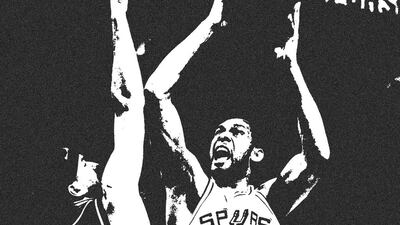To really understand what Tim Duncan was, you might as well start with his nickname.
“The Big Fundamental.” Evoking how he could do all of the required tasks of the game of basketball exceptionally, only, see, he was also really tall.
It always vastly undersold Duncan's skills, which encompassed far, far more than a mere mastery of the fundamentals. But it speaks to how he was seen for a very long time. Steady, consistent, excellent but never especially conspicuous, as far as superstar NBA players go.
He had a great hook shot, probably the best since Kareem Abdul-Jabbar. He had a perfect bank shot. He had a silky-soft touch and deft footwork inside. He could pass and dribble and set screens and play transition defence, and in all the unparalleled soundness of his game he basically stood as the human embodiment of basketball camp.
When coaches try to mould basketball players, what they want the end product to be is Tim Duncan.
More NBA
• Podcast: Kevin Durant joins the Golden State Warriors, and we try to make sense of it
• Kevin Durant: Golden State Warriors will be loved and hated, but cannot be missed
It was in this way that he was always kind of considered unremarkably remarkable. It was a perception that he only reinforced by being maybe the most soft-spoken among the game’s prominent figures, playing for the buttoned-up San Antonio Spurs.
To feed that any more, though, would be an obfuscatory accounting of Duncan. If at his peak he was broadly painted as unremarkably remarkable, it is ironic to consider how special a young Tim Duncan would seem stepping into today’s great-big-man starved NBA.
Duncan was, foremost, an impossible combination of size and grace. Yes, he did all the little things well, but he also did fantastical big things.
He could put the ball on the floor in the post, burst to the rim and throw down a dunk as quick as anyone. He could stretch his improbably long arms over seven-footers and slam it. He once muscled around a guy near the free throw line, threw the ball off the backboard, stepped to the hoop, jumped, and jammed it down all on his own.
For all the plaudits and writerly adoration his brilliance with the basics won him, the idea here is he could also just dunk the dang ball, too. Hard.
He was dominant. That's what was obscured in all the fundamentals fetishising that attended talk of Tim Duncan. He wasn't just some quiet giant who humbly played his role for the team. He was the central figure for multiple title teams in a way no big man has been since.
Duncan scored over 20 points per game in nine of his first 10 seasons and ranked in the top-10 five times. He retires, in fact, 17th all-time in scoring.
It may be a bit hard to remember now, as he’s extended his career another decade as a less heavily relied upon centre, but in his younger days as a power forward he was an out-and-out, back-to-the-basket scorer, and a prolific one. Maybe as prolific a one as we are bound to see again.
Survey the basketball landscape of recent years, and it is hard to find someone who quite compares. Maybe Amare Stoudemire at his peak over half a decade ago. Pau Gasol, set to replace Duncan in the San Antonio line-up next season, has been similar, though both he and Stoudemire were contemporaries of Duncan, not baton-takers.
Blake Griffin sometimes seems the part – you can tell when he faces up and tries to go backboard he has studied Duncan, but as far as working at the rim he’s never quite had Duncan’s smooth, self-contained post game. Griffin likes to throw down more by cutting and leaping, less by backing guys down and slipping them.
Jahlil Okafor arrived in the NBA last year with promise and a somewhat comparable skill set but was barely even productive, on one of the most putrid teams in recent memory.
No one, really, has come into the league so polished and so able to play in that way since Duncan himself. He won a title in his second season as a key component, with David Robinson, in a big-men focused team. At his peak he was the lead figure on three more title teams in a five-year span.
Who could even conceive of such a thing anymore?
It doesn’t feel overdramatic to say Duncan is the last of his kind. It just seems self-evident.
His were the last title-winning sides to truly rely on a post scoring presence. There hasn’t been an even pronounced post threat on a championship team since the Los Angeles Lakers with Gasol won in 2010.
And yet it is a testament to Duncan’s enduring excellence that as this shift occurred and his skills diminished, he refashioned himself and continued to play at an all-star level even as he just about ticked over to 40. And for his efforts he won a fifth, unforgettable title three seasons ago.
It sounds a bit strange to say it, but Tim Duncan was probably sold a bit short, all in all. At his heydey, he was tagged “boring” and though it was kind of meant endearingly, it also eclipsed how sublime his game was.
Much more than the beauty of his fundamentals, the NBA will dearly miss that, the transcendence of that skill packaged quite like that.
Follow us on Twitter @NatSportUAE
Like us on Facebook at facebook.com/TheNationalSport

